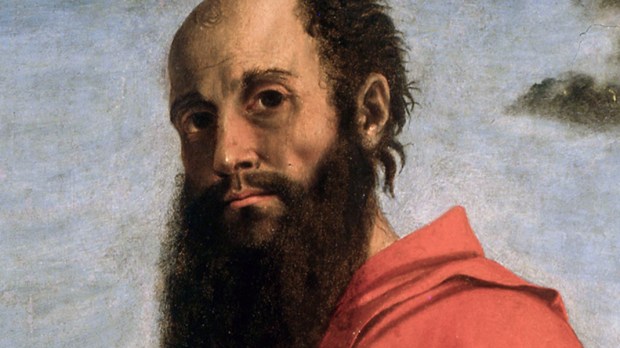St. Paul never met Christ during His time on earth, but he became one of Our Lord’s most ardent followers, and one of the most apostolic missionaries the world has ever known. Yet perhaps what’s most amazing about him—what he is best remembered for over the centuries—is that, by all accounts, he never should have been a missionary at all.
When St. Paul first appears in Scripture, he is ardently persecuting the nascent Christian Church. His utter change of heart, from condoning the stoning of St. Stephen (Acts 6:58) to joyfully accepting the same martyr’s crown, is one of the most shocking reversals in Christian history.
All these years later, his conversion story is still vitally important, and the inner qualities that made it possible can profoundly affect our own daily lives.
The courage to admit a mistake
St. Paul’s sudden change of heart reveals a very rare trait: He was open to having his mind changed. It sounds simple enough, but listening with an open heart to new information, and then integrating that new information in a way that brings about a shift in thought and behavior, takes extraordinary humility. But this is how true conversion of heart happens.
No one likes to admit they’ve been mistaken; humble pie is always a distasteful dish. But Scripture tells us, over and over, that pride is corrosive to the soul. It takes real humility of spirit to be open to having our minds changed, as St. Paul’s was, and this humility draws us closer to God and His truth: “God opposes the proud, but gives grace to the humble” (James 4:6).
What could this kind of everyday humility look like? A person with a humble spirit like St. Paul’s might find himself saying these kinds of phrases:
- I had no idea. This is good to know.
- I’m going to consider what you said.
- I shouldn’t have done/said that.
- Oh wow, I didn’t know that. I’ve changed my mind.
- I never thought of it that way before. Thank you for explaining.
- I’ll take this new information into account.
Hearing God’s voice
Now, it’s all very well to be open to changing your mind when God literally knocks you to the ground, as happened to St. Paul on the road to Damascus:
As he was traveling, it happened that he was approaching Damascus, and suddenly a light from heaven flashed around him; 4 and he fell to the ground and heard a voice saying to him, “Saul, Saul, why are you persecuting Me?” 5 And he said, “Who are You, Lord?” And He said, “I am Jesus whom you are persecuting (Acts 9:3-5).
Who wouldn’t change their minds under those unusual circumstances? But most people aren’t hearing voices from Heaven ordering them to amend their ways. So why is St. Paul’s willing change of heart so worthy of imitation?
First, because God still speaks to each of us today; and second, because St. Paul’s humility of soul was not limited to this one event, but a critical part of his ongoing ministry and personal holiness.
St. Paul heard God’s voice loudly, but every day God speaks to each one of us in countless ways: through Sacred Scripture, through events in our lives, through the people around us, and directly in our own hearts. We can hear His voice, and know His will for us, if we make space in the daily hubbub to hear that “still, small voice” in our souls.
For St. Paul, too, this extraordinary event on the road to Damascus was not a solitary act of humility. Rather, like a chain reaction, it sets off a lifelong pattern of countless conversions of the heart back toward God. Pope Francis has called St. Paul “the model of humility for us priests.” His writings repeatedly urge humility, forgiveness, and gentleness of spirit, as in this passage:
“Put on then, as God’s chosen ones, holy and beloved, heartfelt compassion, kindness, humility, gentleness, and patience, bearing with one another and forgiving one another, if one has a grievance against another; as the Lord has forgiven you, so must you also do” (Colossians 3:12-13)
Most of us, however, are not called to dramatic reversals of our entire life’s purpose, as St. Paul was. Rather, we can imitate him in small acts of renouncing pride and anger, and embracing the crosses of our individual vocations.
As modern-day disciples seek to live with St. Paul’s missionary spirit, let’s not forget about his humility, which closely attended his evangelical zeal. Willingness to listen and to change altered Saul’s life forever, and can change ours too, if we let it.

Read more:
How true humility leads to more self-confidence

Read more:
11 Tips for growing in humility

